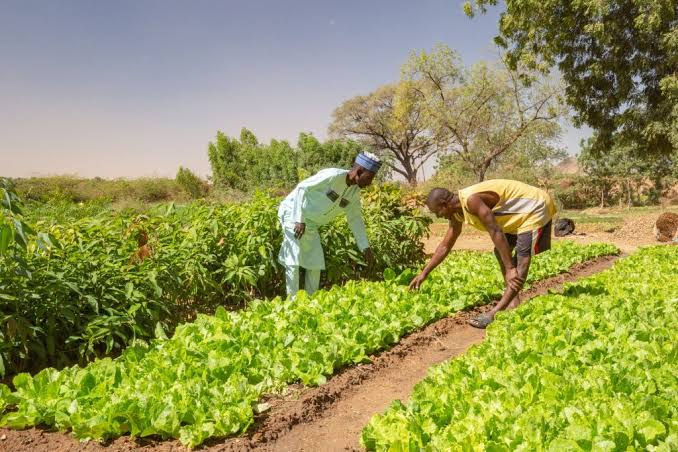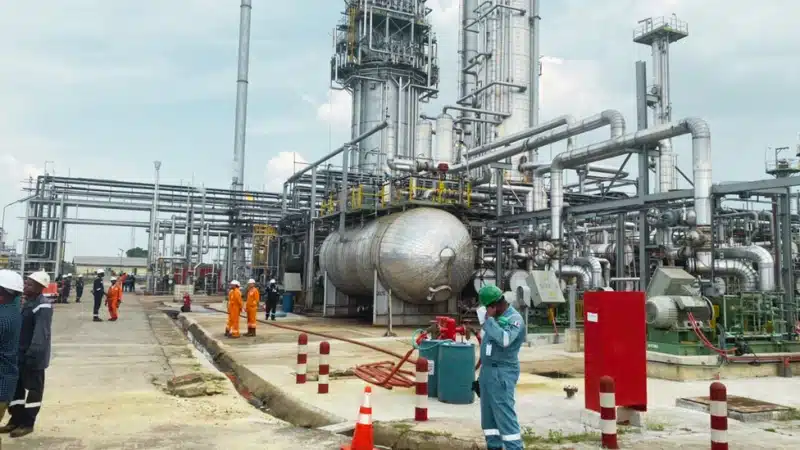Nigeria’s annual inflation rate rose to 33.95 per cent in May from 33.69 per cent in April, the National Bureau of Statistics (NBS) said on Saturday.
The statistics office said the May headline inflation rate showed an increase of 0.26 per cent points when compared to the April 2024 headline inflation rate.
On a year-on-year basis, the NBS said, the headline inflation rate was 11.54 per cent points higher compared to the rate recorded in May 2023, which was 22.41 per cent.
“This shows that the headline inflation rate (year-on-year basis) increased in the month of May 2024 when compared to the same month in the preceding year (i.e., May 2023),” it said.
Meanwhile, the bureau said on a month-on-month basis, the headline inflation rate in May was 2.14 per cent, which was 0.15 per cent lower than the rate recorded in April (2.29 per cent).
This, it said, means that in the month of May, the rate of increase in the average price level is less than the rate of increase in the average price level in April.
According to the report, the food inflation rate in May quickened to 40.66 per cent on a year-on-year basis, which was 15.84 per cent points higher compared to the rate recorded in May 2023 (24.82 per cent).
Nigerians need credible journalism. Help us report it.
PREMIUM TIMES delivers fact-based journalism for Nigerians, by Nigerians — and our community of supporters, the readers who donate, make our work possible. Help us bring you and millions of others in-depth, meticulously researched news and information.
It’s essential to acknowledge that news production incurs expenses, and we take pride in never placing our stories behind a prohibitive paywall.
Will you support our newsroom with a modest donation to help maintain our commitment to free, accessible news?
In recent years, food prices have been on the rise across Nigeria. The situation deteriorated due to the impact of government policies such as the removal of subsidies on petrol, among others.
Nigeria’s naira has, on several occasions, plunged to record lows across both the official and unofficial markets amidst an increased forex demand and a surge in the prices of goods and services across the country.
This prompted the Nigerian government to put measures and reforms in place to safeguard the country’s foreign exchange market and combat speculative activities.
Details
In its inflation report Saturday, the NBS said the contributions of items on the divisional year-on-year level to the increase in the headline index are “food & non-alcoholic beverages (17.59 per cent), housing, water, electricity, gas & other fuel (5.68 per cent), clothing & footwear (2.60 per cent), and transport (2.21 per cent).”
Others are “furnishings & household equipment & maintenance (1.71 per cent), education (1.34 per cent), health (1.02 per cent), miscellaneous goods & services (0.56 per cent), restaurant & hotels (0.41 per cent), alcoholic beverage, tobacco & kola (0.37 per cent), recreation & culture (0.23 per cent) and communication (0.23 per cent).”
The percentage change in the average CPI for the twelve months ending May 2024 over the average of the CPI for the previous twelve-month period was 29.06 per cent, showing a 7.86 per cent increase compared to 21.20 per cent recorded in May 2023.
Food inflation
The Food inflation rate in May 2024 was 40.66 per cent on a year-on-year basis, which was 15.84 per cent points higher compared to the rate recorded in May 2023 (24.82 per cent).
The bureau said the rise in food inflation on a year-on-year basis was caused by increases in prices of semovita, oat flake, yam flour prepackage, garri, bean, etc (which are under bread and cereals class), irish potatoes, yam, water yam, etc (under potatoes, yam and other tubers class), palm oil, vegetable oil, etc (under oil and fat), stockfish, mudfish, crayfish, etc (under fish class), beef head, chicken-live, pork head, bush meat, etc (under meat class).
On month-on-month headline inflation, the month-on-month Food inflation rate in May 2024 was 2.28 per cent, which shows a decrease of 0.22 per cent compared to the rate recorded in April 2024 (2.50 per cent).
“The average annual rate of Food inflation for the twelve months ending May 2024 over the previous twelve-month average was 34.06 per cent, which was 10.41 per cent points increase from the average annual rate of change recorded in May 2023 (23.65 per cent),” the report said.
Support PREMIUM TIMES' journalism of integrity and credibility
At Premium Times, we firmly believe in the importance of high-quality journalism. Recognizing that not everyone can afford costly news subscriptions, we are dedicated to delivering meticulously researched, fact-checked news that remains freely accessible to all.
Whether you turn to Premium Times for daily updates, in-depth investigations into pressing national issues, or entertaining trending stories, we value your readership.
It’s essential to acknowledge that news production incurs expenses, and we take pride in never placing our stories behind a prohibitive paywall.
Would you consider supporting us with a modest contribution on a monthly basis to help maintain our commitment to free, accessible news?
TEXT AD: Call Willie - +2348098788999



















 English (US) ·
English (US) ·